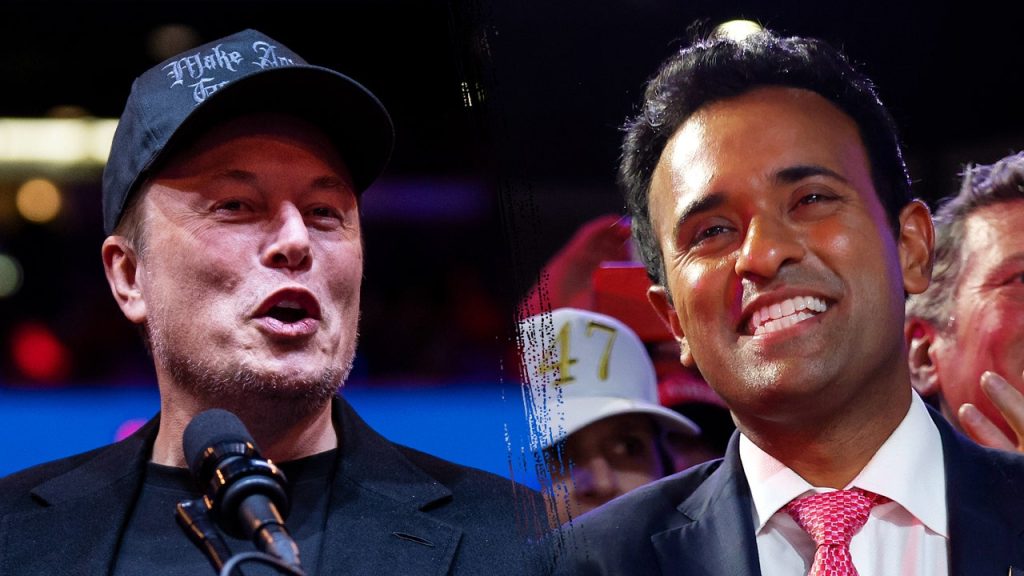The Republican Party is gearing up for a major push towards spending cuts in the upcoming year, but internal divisions and skepticism within the GOP ranks threaten to derail their ambitious plans. Elon Musk and Vivek Ramaswamy, appointed by President-elect Trump to lead the Department of Government Efficiency (DOGE), an advisory panel focused on reducing spending and the national debt, recently met with lawmakers on Capitol Hill to discuss strategies for achieving this goal. While DOGE primarily focuses on executive actions, many Republicans acknowledge that lasting change requires legislative action, a prospect that some find daunting given the deep fissures within their own party.
The skepticism stems from a perception that many GOP members who publicly advocate for fiscal responsibility have not consistently supported spending cuts in their voting records. Representatives like Tim Burchett of Tennessee and Dan Bishop of North Carolina have voiced concerns about their colleagues’ reluctance to translate tough talk into concrete action. Burchett questioned whether the presence of Musk and Ramaswamy would be enough to galvanize meaningful change, expressing concern about the GOP losing momentum and emphasizing the need for accountability. Bishop echoed this sentiment, noting the disconnect between suggestions for savings offered during brainstorming sessions and the actual votes cast on the House floor.
The DOGE initiative has exposed longstanding tensions within the House GOP, particularly regarding government funding and fiscal policy, which consumed much of the 118th Congress. With the national debt exceeding $36 trillion, the stakes are high, but the path forward remains unclear. While some House GOP aides express optimism about the renewed focus on spending cuts, they also acknowledge the significant hurdles ahead. One aide described Musk and Ramaswamy’s approach as “swinging for the fences,” recognizing that Congress ultimately bears the responsibility for implementing any proposed cuts. Another aide expressed deeper pessimism, doubting the GOP’s willingness to make the difficult choices necessary to address the nation’s fiscal challenges.
Representative Chip Roy of Texas, a vocal proponent of fiscal conservatism, has called on his colleagues to “grow a spine” and take decisive action on spending cuts. He argues that Congress needs to adopt a mindset similar to that of families managing their household budgets, prioritizing essential needs over discretionary spending. Roy contends that without a fundamental shift in approach, even the most effective waste-cutting initiatives will be insufficient to address the growing debt crisis. He advocates for a two-pronged approach: identifying and eliminating wasteful spending while simultaneously summoning the political will to make difficult but necessary cuts.
Adding to the internal debate, some Republicans harbor reservations about Musk and Ramaswamy’s leadership of the DOGE initiative. One anonymous lawmaker dismissed their proposals as a “wish list” with little chance of realization, criticizing the newly formed department as a “magical” entity lacking a concrete plan. This lawmaker also mocked the DOGE logo, highlighting its resemblance to the cryptocurrency “dogecoin” championed by Musk, and expressed confidence that Congress would ultimately reject their unrealistic proposals. This internal dissent further complicates the GOP’s efforts to present a united front on fiscal policy.
The Republican Party faces a critical juncture in its efforts to address the nation’s mounting debt. While the DOGE initiative has sparked renewed discussion about spending cuts, deep divisions within the GOP, coupled with skepticism about the feasibility of proposed changes, threaten to undermine any meaningful progress. The challenge for Republicans lies not only in identifying areas for cuts but also in mustering the political will to implement them, overcoming internal resistance and navigating the complexities of the legislative process. The coming months will reveal whether the party can bridge its internal divides and deliver on its promises of fiscal responsibility.

